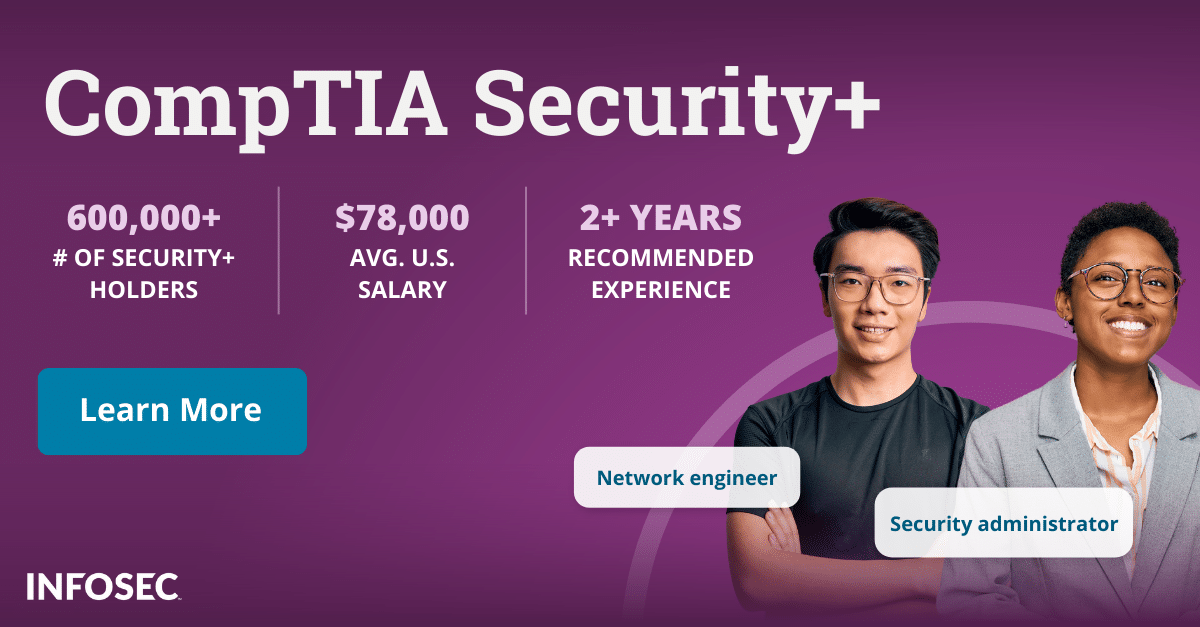Security+ Job Outlook and Opportunities
Are you considering getting your Security+ certification?
If you’re still on the fence, it may help to better understand the types of jobs and career outlook you can expect.
Become a SOC Analyst: get Security+ certified!
More than 47,000 new SOC analysts will be needed by 2030. Get your CompTIA Security+ to leap into this rapidly growing field — backed with an Exam Pass Guarantee.
What kind of jobs can you get with the Security+ Certification?
The CompTIA Security+ certification will help you break into the industry, but for most, it will only be the first step. This certification will get you in the door at companies, but higher-paying jobs will only be available as you add to your resume.
- Systems administrator
- Security administrator
- Security specialist
- Security engineer
- Network administrator
- Junior IT auditor/penetration tester
- Security consultant
These are just a handful of examples of jobs you could pursue with a Security+ certification. You can find more about these job roles in the network and computer systems administrators section of the U.S. Bureau of Labor Statistics, who predict a 5% rise in the number of jobs in these categories from 2020-2030. As we pointed out with some of the job types above, you’ll most likely require some form of relevant experience, as well. This may mean either with a certain type of software or customer service. Your Security+ certification may also need to be accompanied by other credentials like security clearances or other certifications. Obviously, the longer you work in the industry, the better your prospects will be, as well.
What does the current job market look like for those certified?
To put it simply, the cybersecurity job market has never looked better for those who are certified in IT security. In fact, it would be hard to think of another industry that can offer the same type of job security to individuals.
All of IT is seeing an upward trend for very understandable reasons. We’re living in the digital age, which means companies are constantly looking to expand or improve their IT infrastructure; doing so often involves a direct impact on their ROI.
The great thing about the Security+ certification is that it’s not vendor-specific, which will give you a much better chance of landing entry-level jobs across the industry. It also helps that this certification is known all over the world with such a long history.
In 2016, almost 27,000 jobs required that applicants have a Security+ certification. As the need for better network security measures and risk management practices increases, you can expect that businesses and organizations will continue to look for applicants with this qualification.
According to a survey done last year by CompTIA, 93% of IT professionals reported that they had regularly worked with security and cyber security applications. Furthermore, according to another survey they did, 62% of managers in the U.S. who were hiring for IT positions indicated that security skills are a “must have” to be considered for a position.
The hands-on nature of Security+ makes it an especially important credential to have on your resume if you’re looking to earn one of these jobs in IT.
However, one major factor that needs to be brought up when it comes to your job outlook is where you live. Some cities simply have many more opportunities for those working in IT than others. That will also have an impact on how much you can expect to make.
Here are the top cities to work in IT at the moment, including the best cities in each one:
- Alexandria, Virginia
- Anaheim, California
- Arlington, Texas
- Arlington, Virginia
- Atlanta, Georgia
- Boston, Massachusetts
- Chicago, Illinois
- Dallas, Texas
- Elgin, Illinois
- Hayward, California
- Jersey City, New Jersey
- Long Beach, California
- Los Angeles, California
- Naperville, Illinois
- New York City, New York
- Oakland, California
- San Francisco, California
- San Jose, California
- Seattle, Washington
There are also remote positions you may be able to apply for in some of these cities that would not require you to relocate.
How should the Security+ Certification be highlighted in a resume?
When you apply for a job in IT, your resume will most likely get “read” by a technology solution before an actual person even sees it. Therefore, it’s important to include your Security+ certification on your resume along with your degree and any other important requirements that were listed in the job post.
While most people who review your resume will immediately understand what the Security+ certification entails, it’s not a bad idea to take a line or two to explain it, as well. Doing this will ensure there is no room for error on the part of the person reviewing your resume (sometimes, an HR person is doing initial reviewing for vetting purposes and may not be as familiar with the industry).
Don’t forget about the other credentials or types of experience that were mentioned in the job post. Having Security+ certification may not be sufficient to land the role on its own.
If you don’t have a certain requirement, it might still be worth applying. Always use the line, “I know I don’t have the right experience, but…” and explain why you’re still worth the company’s consideration.
Another magic term is “transferrable skills.” Use this as a header in your resume to draw attention to credentials you have that were not necessarily asked for in the job post but would still benefit their company. Obviously, you have to be careful not to overreach here. If you can’t make the case that your “transferrable skills” are actually relevant, you’ll look like you don’t actually understand the role.
Furthermore, this gives you a great opportunity to include some of those keywords their software may be looking for. You can make the most out of this opportunity by considering the position you’re applying for and then highlighting the most relevant features of your Security+ certification training.
Looking for security+ training online? Fill out the form below for InfoSec Institute's course details/pricing.
Interview Tips for Certification Holders
Once your resume has been reviewed and you are called for an interview, half the battle is over. A number of other candidates may have also been tapped for an interview, but, like most people, they’re going to be nervous and, if they prepare poorly, you’ll have a significant opportunity.
The first thing you need to do to impress during your interview is to set yourself up for success. This means dressing well and showing up on time. Make sure you know where the interview is going to be and rehearse getting there the day before. Then leave nice and early so no unforeseen delay will be enough to impede your punctuality.
Dressing well is important, too. If you make a good first impression by showing up on time and looking like you’re taking this opportunity very seriously, that initial feeling will stay with the interviewers, even if you make a couple of mistakes afterwards.
As far as the questions go, you should expect the obvious. Prepare for old standbys like:
- Why do you want this job?
- Where do you see yourself in five years?
- What’s a weakness you could improve?
- What did you do in your last position?
However, you also need to expect questions specific to the position. Don’t just assume that they’ll take for granted that your Security+ certification means you’re competent enough to do the job well. Even if they’re familiar with the certification, they won’t want to take any chances, especially if they have a large talent pool to choose from.
Therefore, you should consider common scenarios people in the position you’re applying for would face on a regular basis and even some less common ones.
Let’s say you’re applying to be a network security professional at a large corporation, for example. The person interviewing you might ask something like, “What would you do if you wanted to filter a packet before it traverses the network?”
“What would you do to encrypt email transmissions?” would be another question you could probably safely assume is coming.
Read this Top 25 Security+ Interview Questions article for more help.
It will really benefit you take some time to learn about the company, as well. With enough research, you’ll be able to anticipate how your skills may be able to help them (something that should go into in your cover letter) and, thus, what kinds of questions they may ask you during the interview.
If you know anyone in similar roles, ask them what kinds of interview questions they were asked. This is a great way to prepare and will also give you some insights into the role that you can bring up during the interview and potentially impress the hiring manager.
Everyone wants a rewarding career with good job security and a decent paycheck that will also be personally rewarding. Working in IT security ticks all these boxes. Not only will you be making a real difference in a challenging field, but there’s also no reason to think your skills will ever become obsolete.
If this sounds like a good fit for you, the InfoSec Institute Boot Camp will prepare you for this exciting career.
For more on the Security+ certification, view our Security+ certification hub.
Sources:
https://www.job-hunt.org/IT-job-search/resume-tips-new-IT-professional.shtml
/cyber-security-career-planning/#gref
/penetration-tester-career-security-jobs/#gref
http://www.payscale.com/research/US/Certification=CompTIA_Security%2B/Salary



